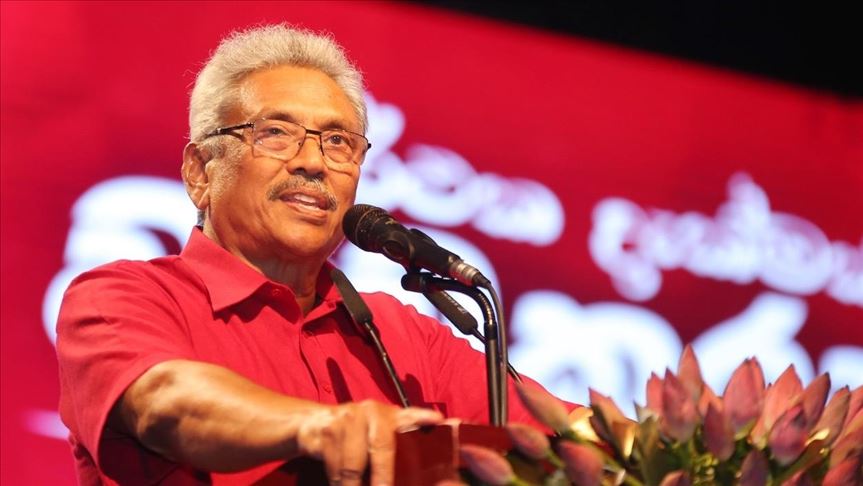Gotabaya Rajapaksa - ‘Man of action’ becomes Sri Lanka’s new president
New president is 'not a traditional politician', a man of action and efficiency, say his aides

COLOMBO, Sri Lanka
Known for his no-nonsense approach, Sri Lanka's new President Gotabaya Rajapaksa, 70, is a "man of action" with little tolerance for inefficiency, said his close confidant Milinda Rajapaksha, a youth leader in his Sri Lanka Podujana Peramuna party.
Chief Justice Jayantha Jayasuriya administered the oath of office to Rajapaksa at the 140 B.C. Ruwanweli Seya Buddhist temple in the ancient kingdom of Anuradhapura in north-central Sri Lanka. He became the seventh president and first former military officer to assume this highest office in the Buddhist majority South Asian island nation.
Born in Palatuwa in the Matara district, some 186 kilometers (115 miles) from Colombo, the new president is both controversial, as well as a hero for many in the country. He is credited having ruthlessly ended the nearly 30-year long civil war, by defeating Tamil separatist militant group the LTTE. An alumnus of Ananda College, a leading school in Colombo, he also gained a Masters in Defence Studies from the University of Madras in India.
Rajapaksa joined the Sri Lanka Army in 1971 and retired as Lt. Colonel in 1992. As a military officer, he has also attended the counter-insurgency and jungle warfare school in India’s northeastern state of Assam in 1980.
“He is always in a hurry to work and deliver. He does not like to waste time unnecessarily at meetings,” said his aide. Sharing his experiences, while working with the Rajapaksa over the past one year, since he was appointed his spokesperson, Milinda said he is inquisitive and wants any decision taken in a meeting to be implemented immediately.
“He always wants his other colleagues also to match his speed,” the aide told Anadolu Agency.
After his retirement from the military, Rajapaksa migrated to the U.S. where he lived for 10 years. He returned to the country after his elder brother Mahinda Rajapaksa become president in 2005. He was appointed as the defense secretary and to overlook urban development.
During the election campaign, the opposition charged that he was holding dual citizenship. Rajapaksa claimed he had renounced his U.S. citizenship earlier this year to contest the presidential elections. The Supreme Court in October also dismissed the petition challenging his citizenship and cleared him of all the allegations.
Like a school teacher
Besides a military background, the new president is also a technocrat. He has also worked as a systems administrator at Loyola Law School in California. “Once he approves any project, he will consciously visit the location to oversee its completion,” said Milinda.
Even if a conference is organized, he will go with military precession to know details like the background of every speaker and even what will they speak etc.
While his military experience helped him to crush the LTTE in 2009, the war ended with a lot of controversies. According to the UN, some 40,000 civilians died during the conflict. He was also accused of supervising a secret group to silent dissent.
Rajapaksa secured more than 52% of popular votes, although the large number of country’s minorities, Hindus, Tamils and Muslims did not back him. The Hindus and Muslims together constitute approximately 20% of Sri Lanka’s population. While ethnic Tamils accuse him of war crimes, Muslims fear his popularity among Sinhalese Buddhists will further deepen the divide between the two communities post the Easter Sunday attacks that claimed 259 lives.
The new president, however, allayed fears of both communities. Soon after assuming office, he appealed to them to rally around him.
Rajapaksa is 'not a traditional politician'
The new president is expected to appoint new faces in his administration and give tickets to young cadres of his party in the next year parliamentary elections. Rajapaksa is likely to make vital changes by appointing young faces to key positions in his government, according to Milinda.
Milinda described his workstyle like that of a school teacher. “He is like a school teacher, if the math is correct, he will give you 100 marks, but, if you resort to nonsense then he will land you in trouble,” said the aide, while sharing his year-long experience with Rajapaksa.
Dinesh Gunawardena, a family friend of Rajapaksas, said the new president is "a very calm person", who gives a patient hearing and never rushes to immediate conclusions like traditional politicians are known to.
"He is a workaholic who is always punctual, and is committed to any task given to him, which is very different when compared with many other politicians," Gunawardena told Anadolu Agency.
Gunawardena, who is a member of parliament, attributed Rajapaksa's unique qualities to perhaps his exposure and experience gained when he was living in the U.S.
"He believes in taking advice from professionals, who have a clear understanding depending on the matter. He definitely is not a traditional politician," he said.
Rajapaksa also loves to read, according to Gunawardena.
The new president will be a man to watch on human rights front and also maintaining relations with India and China. He had made it clear during his election campaign that he will not honor the country’s commitments to the UN Human Rights Council (UNHRC) on post-war accountability and reconciliation.
Sri Lanka co-sponsored a UNHRC resolution in September 2015 and committed to fulfil a range of measures dealing with human rights, accountability and transitional justice. As many as 25 countries, including India, had voted in favor of the document in the 47-nation Council.
Anadolu Agency website contains only a portion of the news stories offered to subscribers in the AA News Broadcasting System (HAS), and in summarized form. Please contact us for subscription options.







